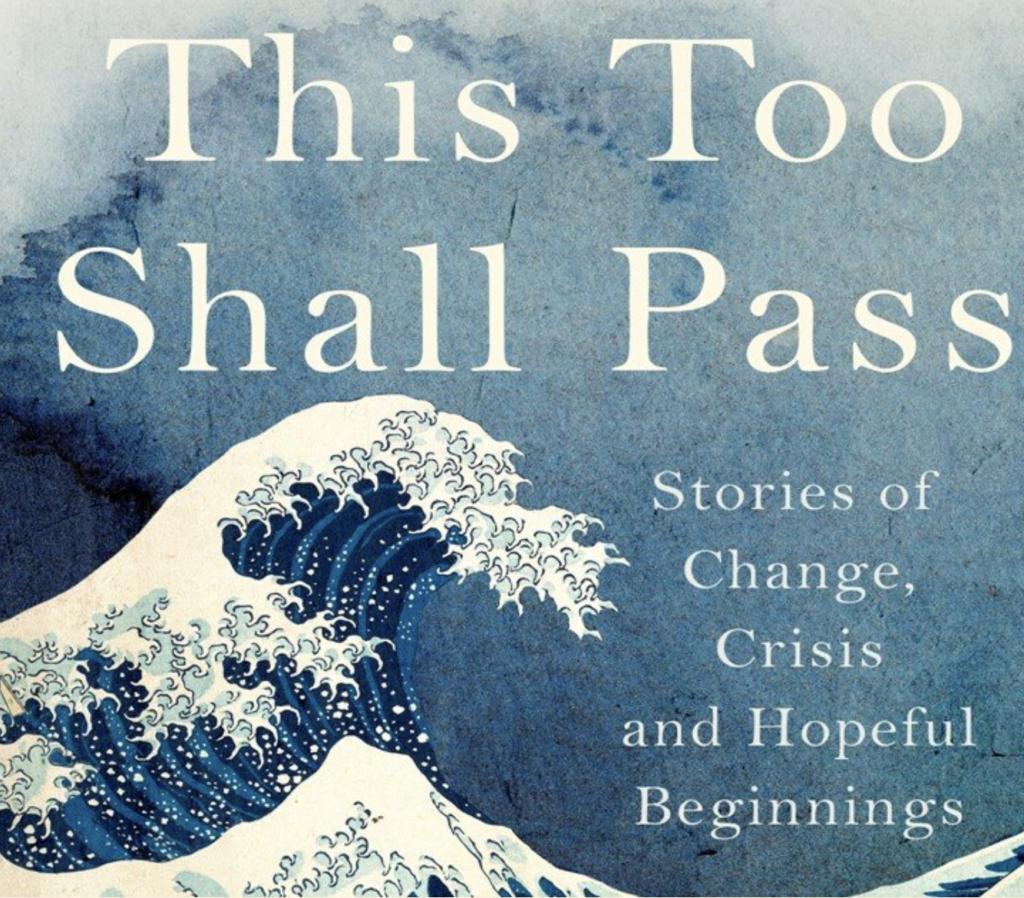Excerpeted from « This Too Shall Pass: Stories of Change, Crisis and Hopeful Beginnings » by Julia Samuel

“Pain is the agent of change: if we build walls around it, it remains untouched and alive inside us, slowly contaminating our other feelings. It is in the movement between the poles of the past and the future that we adapt. Our innate drive to get on is profoundly powerful, yet we need to slow down, to give ourselves space between our old and new selves. In therapy, we call this a ‘fertile void’, a time of not knowing, a neutral zone of uncertainty that is uncomfortable or even crazy-making. When we block it, the same problems may reoccur in every phase of life. If we accept the pain of change, and learn how to adapt, we will have the energy and confidence to take the next step.”
“Even the most robust people can find change difficult. The thread that connects them, whatever their age or circumstance, is that each person had to work on themselves actively to understand their unique response to change, and develop the necessary coping mechanisms. ”
“In the last fifty years there have been seismic shifts in the West in every aspect of life, and now people have to cope with more change than ever before. The past is no longer a reliable predictor of the future, and the twenty-first century is more fluid: all of the old certainties – age, gender, sexuality – are being questioned and boundaries broken. It seems we live in a culture of limitless choice. Most of these changes may be positive, but life is now infinitely more complex. These factors, and the overwhelming number of choices we face, have heightened the possibility of more existential crises.”
“A good life is built with good relationships.’ How we construct them is the foundation of everything else. Again and again, through my research and work with my clients, I see we cannot do it alone, whatever life stage we have reached. People need people, and the quality of those relationships is what matters most to us when we look back at our lives.”
“Life is a set of alternating phases, a period of change followed by a period of stability, then another change. Research shows we tend to take stock and think about change every seven to ten years (yes, the seven-year itch is a thing), and the process of change can take up to a year to be integrated into our life. Sometimes the changes feel like success, at others failure, but the key is to learn from them.”
“It is well researched that the more we allow ourselves to learn and expand in response to life changes the more likely we are to thrive. ”
“Often we adapt to change by making tiny adjustments. As in all psychological theories, nothing is certain, in some cases a sudden shift can liberate and transform someone. ”
“This too shall pass” review by The Guardian
The only constant is change, said Heraclitus in about 500BC, yet we are rarely prepared for the significant transitions in our lives. Julia Samuel, a psychotherapist and grief counsellor, has followed up her acclaimed debut, Grief Works, with these “accounts of change, crisis and hopeful beginnings” organised around the themes of family, love, work, health and identity. She draws on patient case studies as well as the insights of 30 years of clinical practice.
In the space between phases – known as the ‘fertile void’ in therapy parlance – we must sit with discomfort for a while
Relationships of all types must adapt to survive; Samuel quips that she herself has had five different marriages, all with the same husband. We meet a mother learning to loosen the grip on her adult daughter, and a man adjusting to the upheaval of new fatherhood. In her discussion of love, Samuel explores “the friction between the desire for predictability versus freedom – safety versus excitement”. She shares stories about marriage, infidelity, sexual obsession and looking for love at various stages of life. Maria, a married woman with a steady lover, is struggling to overcome an infatuation with a second lover (where does she find the time?) after he breaks off the affair. All those involved, including her husband, are respectful of the relationships.
Becoming a grandmother at 47 led me, as a therapist, to rethink my response to change
Samuel considers first jobs, maternity leave, getting fired and retiring. The theme of health covers expected changes, such as the menopause, as well as illness. A story from Grief Works about a family mourning their four-year-old who died in a swimming pool has continued to haunt me. The most heart-wrenching case here is that of Ben, a widowed father of two who has just started to adjust to his bereavement when he receives a life-threatening cancer diagnosis. Samuel has not cherry-picked cases to portray herself as a saviour. Nor does she consider therapy a cure-all: she concedes what Ben needs is not counselling but a turn of luck.
In the chapter on identity we encounter a Kurdish refugee, a young man coming out, and KT, a patient who identifies as gender non-binary. Samuel calls KT’s ghosting lover “a complete fucker” (and dubs another patient’s bullying investor “the Tosser”).
Sometimes change arrives abruptly, other times it’s part of the natural ebb and flow of life. Research shows that people tend to take stock every seven to 10 years. In the space between phases – known as the “fertile void” in therapy parlance – we must sit with the discomfort for a while. Bypassing it can curb “potential growth” and satisfaction in the new phase.
For Samuel, the key to resilience is the quality of our relationships: family and friends can buoy us in turbulent times. Yet: “In England more than a million older people can go for over a month without speaking to their family, friend or neighbour.” The observations of her patients’ progress speak to the value of prolonged talk therapy, as opposed to the less costly cognitive behavioural approach currently favoured by the NHS. We tend to invoke the phrase “this too shall pass” at moments “when life sucks”, Samuel writes. “But here’s the hitch”: moments when life is good will also inevitably pass. Heraclitus’s theory of flux stated that we never step into the same river twice: the river has changed, or else we have. With Samuel guiding us through the rapids, we can forge ahead “with a little more joy, clarity, confidence and … hope”.
This Too Shall Pass: Stories of Change, Crisis and Hopeful Beginnings by Julia Samuel is published by Penguin
